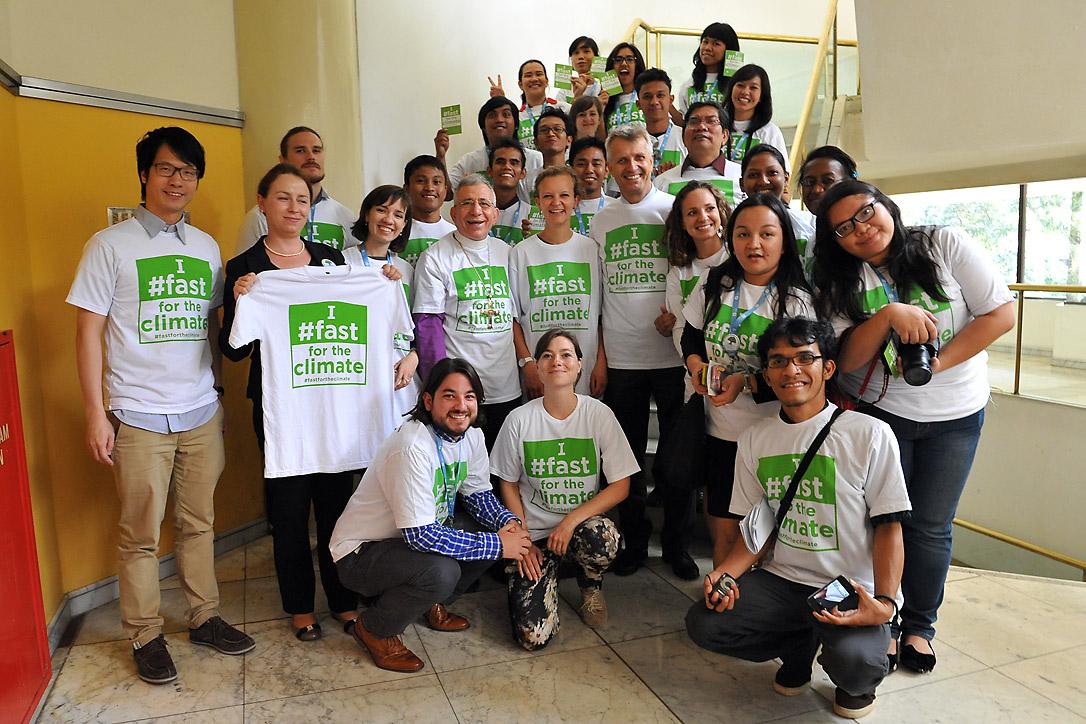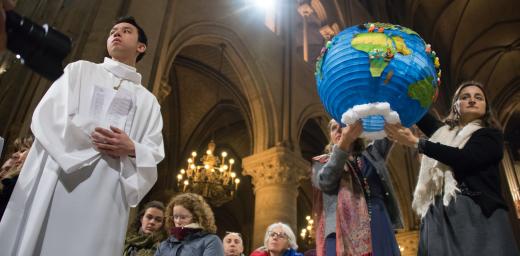Climate change is not an abstract reality for the Lutheran communion

LWF President, Bishop Munib Younan, General Secretary, Rev. Dr Martin Junge and young council members advocate for climate justice. Photo: LWF/Sean Hawkey
Youth and General Secretary lead the LWF at Paris talks
GENEVA, 26 November 2015 (LWI) - The Lutheran World Federation (LWF) approaches the forthcoming United Nations (UN) climate summit in Paris next week with the message that climate change is not an abstract reality to the Lutheran communion of churches.
“It directly affects the member churches in Angola, Greenland, Kenya, Namibia, the United States and many other places, with large communities of vulnerable people displaced by increasingly heavy rainfall and storms and prolonged drought,” says LWF General Secretary Rev. Dr Martin Junge.
Junge will join LWF’s observer delegation comprising youth from the seven regions of the global Lutheran communion at the historic negotiations, 30 November - 11 December. Together with other faith and civil society representatives, they will be urging political leaders to strive for an ambitious and far-reaching agreement that helps to protect those most severely affected by climate change. Activities planned prior to the COP conference include the handing over of a petition by faith leaders to political authorities, and welcoming pilgrims.
“Climate change is a devastating reality for communities in Argentina, Ethiopia, Myanmar, and several other countries, where unusually heavy rainfalls or prolonged drought have destroyed large extensions of land,” he argues.
The LWF delegation to the 21st session of the Conference of the Parties (COP 21) to the UN Framework Convention on Climate Change includes young people from Europe, Africa, North America, Asia and Latin America and the Caribbean who have been raising awareness for climate justice by incorporating perspectives on gender justice, human rights and ecumenical solidarity, as well as artistic expressions.
The delegation will also visit the three LWF member churches in France: Malagasy Protestant Church in France, Union of Protestant Churches of Alsace and Lorraine, and the United Protestant Church of France. At this year’s COP, the delegation will host the “Fast and Feast for the Climate” event to formally conclude a global fasting initiative on the first day of each month in solidarity with vulnerable people, which the LWF started with other faith and secular organizations at the 2013 conference in Warsaw, Poland.
Junge says these approaches help to amplify that Lutheran theological understanding has something critical to offer to the debate around climate change, particularly the idea that freedom should not be separated from accountability.
“Freedom can’t be invoked as a reason to continue depleting resources that won’t be available to others, or to future generations,” he argues.
LWF’s action around climate change dates to the Sixth LWF Assembly at Dar es Salaam in 1977 and has mainly centered on justice, peace and the care of creation. More recently at its June 2015 Council meeting, the LWF endorsed the policy to not invest in fossil fuels and affirmed its commitment to become carbon neutral by 2050.



